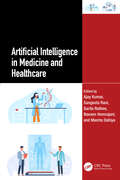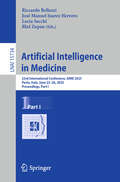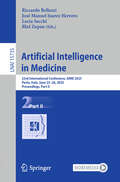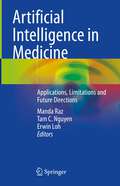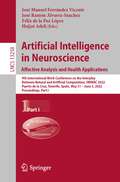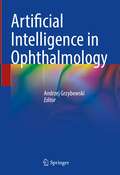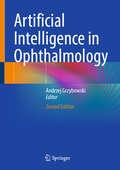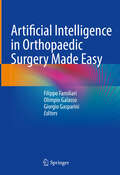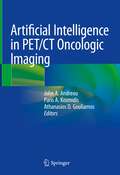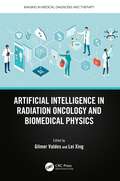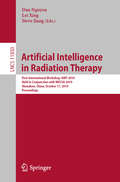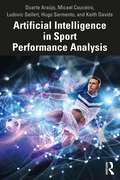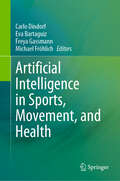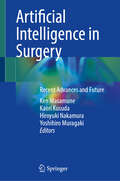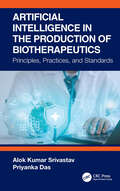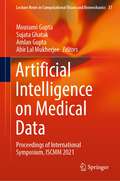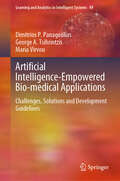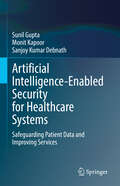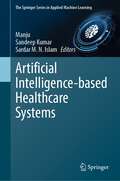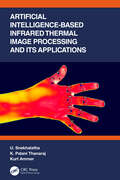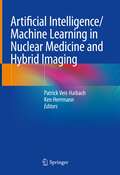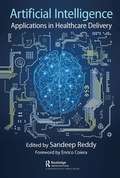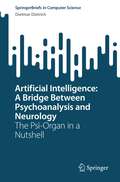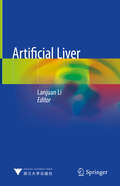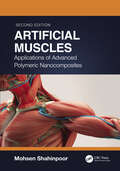- Table View
- List View
Artificial Intelligence in Medicine and Healthcare
by Ajay Kumar Mamta Dahiya Sangeeta Rani Sarita Rathee Naveen HemrajaniThis book is discussing artificial intelligence-based smart systems for diagnosis and prediction of diseases, artificial intelligence in clinical decision-making, and artificial intelligence tools for clinical and healthcare data. It further highlights the importance of 5G and 6G communication for telemedicine applications and applications of machine learning and deep learning in pandemic epidemiology.This book: Discusses artificial intelligence-inspired Internet of Things-based solutions, and machine learning modeling for smart healthcare Explains the use of computer vision, natural language processing in healthcare, and artificial intelligence in clinical decision-making Illustrates the role of artificial intelligence in telemedicine applications Examines medical image analysis using machine learning, and deep learning techniques It is primarily written for senior undergraduates, graduate students, and academic researchers in the fields including computer science and engineering, electronics and communications engineering, and biomedical engineering.
Artificial Intelligence in Medicine: 23rd International Conference, AIME 2025, Pavia, Italy, June 23–26, 2025, Proceedings, Part I (Lecture Notes in Computer Science #15734)
by Lucia Sacchi Riccardo Bellazzi José Manuel Juarez Herrero Blaž ZupanThis book constitutes the refereed proceedings of the 23rd International Conference on Artificial Intelligence in Medicine, AIME 2025, which took place in Pavia, Italy, during June 23-26, 2025. The 49 full papers and 81 short papers included in the proceedings were carefully reviewed and selected from 311 submissions. They deal with the development of theory, methods, systems, and applications of AI in biomedicine, including the application of AI approaches in biomedical informatics, healthcare organization, and molecular medicine.
Artificial Intelligence in Medicine: 23rd International Conference, AIME 2025, Pavia, Italy, June 23–26, 2025, Proceedings, Part II (Lecture Notes in Computer Science #15735)
by Lucia Sacchi Riccardo Bellazzi José Manuel Juarez Herrero Blaž ZupanThis book constitutes the refereed proceedings of the 23rd International Conference on Artificial Intelligence in Medicine, AIME 2025, which took place in Pavia, Italy, during June 23-26, 2025. The 49 full papers and 81 short papers included in the proceedings were carefully reviewed and selected from 311 submissions. They deal with the development of theory, methods, systems, and applications of AI in biomedicine, including the application of AI approaches in biomedical informatics, healthcare organization, and molecular medicine.
Artificial Intelligence in Medicine: Applications, Limitations and Future Directions
by Erwin Loh Manda Raz Tam C. NguyenThis book identifies Artificial Intelligence (AI) as a growing field that is being incorporated into many aspects of human life, including healthcare practice and delivery. The precision, automation, and potential of AI brings multiple benefits to the way disease is diagnosed, investigated and treated. Currently, there is a lack of any appreciable understanding of AI and this book provides detailed understandings, which include; foundational concepts, current applications, future challenges amongst most healthcare practitioners. The book is divided into four sections: basic concepts, current applications, limitations and future directions. Each section is comprised of chapters written by expert academics, researchers and practitioners at the intersection between AI and medicine. The purpose of the book is to promote AI literacy as an important component of modern medical practice. This book is suited for all readers as it requires no previous knowledge, it walks non-technical clinicians through the complex ideas and concepts in an easy to understand manner.
Artificial Intelligence in Neuroscience: 9th International Work-Conference on the Interplay Between Natural and Artificial Computation, IWINAC 2022, Puerto de la Cruz, Tenerife, Spain, May 31 – June 3, 2022, Proceedings, Part I (Lecture Notes in Computer Science #13258)
by Hojjat Adeli José Manuel Ferrández Vicente José Ramón Álvarez-Sánchez Félix de la Paz LópezThe two volume set LNCS 13258 and 13259 constitutes the proceedings of the International Work-Conference on the Interplay Between Natural and Artificial Computation, IWINAC 2022, held in Puerto de la Cruz, Tenerife, Spain in May – June 2022. The total of 121 contributions was carefully reviewed and selected from 203 submissions. The papers are organized in two volumes, with the following topical sub-headings: Part I: Machine Learning in Neuroscience; Neuromotor and Cognitive Disorders; Affective Analysis; Health Applications, Part II: Affective Computing in Ambient Intelligence; Bioinspired Computing Approaches; Machine Learning in Computer Vision and Robot; Deep Learning; Artificial Intelligence Applications.
Artificial Intelligence in Ophthalmology
by Andrzej GrzybowskiThis book provides a wide-ranging overview of artificial intelligence (AI), machine learning (ML) and deep learning (DL) algorithms in ophthalmology. Expertly written chapters examine AI in age-related macular degeneration, glaucoma, retinopathy of prematurity and diabetic retinopathy screening. AI perspectives, systems and limitations are all carefully assessed throughout the book as well as the technical aspects of DL systems for retinal diseases including the application of Google DeepMind, the Singapore algorithm, and the Johns Hopkins algorithm. Artificial Intelligence in Ophthalmology meets the need for a resource that reviews the benefits and pitfalls of AI, ML and DL in ophthalmology. Ophthalmologists, optometrists, eye-care workers, neurologists, cardiologists, internal medicine specialists, AI engineers and IT specialists with an interest in how AI can help with early diagnosis and monitoring treatment in ophthalmic patients will find this book to be an indispensable guide to an evolving area of healthcare technology.
Artificial Intelligence in Ophthalmology
by Andrzej GrzybowskiThis book provides a wide-ranging overview of artificial intelligence (AI), machine learning (ML) and deep learning (DL) algorithms in ophthalmology. Expertly written chapters examine AI in age-related macular degeneration, glaucoma, retinopathy of prematurity and diabetic retinopathy screening. AI perspectives, systems and limitations are all carefully assessed throughout the book as well as the technical aspects of DL systems for retinal diseases including the application of Google DeepMind, the Singapore algorithm, and the Johns Hopkins algorithm. Artificial Intelligence in Ophthalmology, 2nd edition has been fully revised with the latest advancements in the field. New chapters highlight topics such as the threats to the validity of the predictive system performance for ophthalmology, challenges in the deployment of AI for diabetic retinopathy screening and the use of AI in calculating the IOL power to name just a few. This book meets the need for a resource that reviews the benefits and pitfalls of AI, ML and DL in ophthalmology. Ophthalmologists, optometrists, eye-care workers, neurologists, cardiologists, internal medicine specialists, AI engineers and IT specialists with an interest in how AI can help with early diagnosis and monitoring treatment in ophthalmic patients will find this book to be an indispensable guide to an evolving area of healthcare technology.
Artificial Intelligence in Orthopaedic Surgery Made Easy
by Filippo Familiari Olimpio Galasso Giorgio GaspariniThis book is an essential reference guide for the use of artificial intelligence in orthopaedic surgery. It covers all related topics, from machine and deep learning, through practical applications in all orthopaedic sub-disciplines, to ethical issues and potential risks. International renowned experts equip the reader with solid scientific foundations and practical tips combining accurate literature reviews with high-quality original images. Addressing a hot topic for the present and next generation of medical specialists, this book is a must read for orthopaedic surgeons, radiologists and health informatic specialists alike.
Artificial Intelligence in PET/CT Oncologic Imaging
by Athanasios D. Gouliamos John A. Andreou Paris A. KosmidisThis book presents artificial intelligence applications that may help in detecting disease, defining tissue characterization (benign vs malignant), staging and correlation with molecular biomarkers. Originally positioned as a means for noninvasive molecular phenotyping and quantification in the 1970s, PET's technological improvements in the 2000s generated renewed interest in quantification, which has grown over the last five years. This progress is parallel with the development of Artificial intelligence (AI) systems for Oncology which aim at providing the best possible treatment to patients suffering from lung, breast, brain, prostate, liver and other types of cancer. The chapters provide an overview of the use of AI in PET/CT imaging for various types of cancer, and it will be an invaluable tool especially for nuclear medicine physicians and oncologists.
Artificial Intelligence in Radiation Oncology and Biomedical Physics (Imaging in Medical Diagnosis and Therapy)
by Lei Xing Gilmer ValdesThis pioneering book explores how machine learning and other AI techniques impact millions of cancer patients who benefit from ionizing radiation. It features contributions from global researchers and clinicians, focusing on the clinical applications of machine learning for medical physics. AI and machine learning have attracted much recent attention and are being increasingly adopted in medicine, with many clinical components and commercial software including aspects of machine learning integration. General principles and important techniques in machine learning are introduced, followed by discussion of clinical applications, particularly in radiomics, outcome prediction, registration and segmentation, treatment planning, quality assurance, image processing, and clinical decision-making. Finally, a futuristic look at the role of AI in radiation oncology is provided. This book brings medical physicists and radiation oncologists up to date with the most novel applications of machine learning to medical physics. Practitioners will appreciate the insightful discussions and detailed descriptions in each chapter. Its emphasis on clinical applications reaches a wide audience within the medical physics profession.
Artificial Intelligence in Radiation Therapy: First International Workshop, AIRT 2019, Held in Conjunction with MICCAI 2019, Shenzhen, China, October 17, 2019, Proceedings (Lecture Notes in Computer Science #11850)
by Lei Xing Dan Nguyen Steve JiangThis book constitutes the refereed proceedings of the First International Workshop on Connectomics in Artificial Intelligence in Radiation Therapy, AIRT 2019, held in conjunction with MICCAI 2019 in Shenzhen, China, in October 2019.The 20 full papers presented were carefully reviewed and selected from 24 submissions. The papers discuss the state of radiation therapy, the state of AI and related technologies, and hope to find a pathway to revolutionizing the field to ultimately improve cancer patient outcome and quality of life.
Artificial Intelligence in Sport Performance Analysis
by Keith Davids Duarte Araújo Ludovic Seifert Micael S Couceiro Hugo SarmentoTo understand the dynamic patterns of behaviours and interactions between athletes that characterize successful performance in different sports is an important challenge for all sport practitioners. This book guides the reader in understanding how an ecological dynamics framework for use of artificial intelligence (AI) can be implemented to interpret sport performance and the design of practice contexts. By examining how AI methodologies are utilized in team games, such as football, as well as in individual sports, such as golf and climbing, this book provides a better understanding of the kinematic and physiological indicators that might better capture athletic performance by looking at the current state-of-the-art AI approaches. Artificial Intelligence in Sport Performance Analysis provides an all-encompassing perspective in an innovative approach that signals practical applications for both academics and practitioners in the fields of coaching, sports analysis, and sport science, as well as related subjects such as engineering, computer and data science, and statistics.
Artificial Intelligence in Sports, Movement, and Health
by Michael Fröhlich Freya Gassmann Carlo Dindorf Eva BartaguizThis comprehensive work explores Artificial Intelligence´s profound impact on revolutionizing how we approach sports, movement, and health. It presents a rich collection of insights, practical applications, and perspectives poised to transform these domains. Therefore, leading experts in the fields were brought together, offering diverse perspectives and applications across various disciplines. Through the examination of real-world use cases and future possibilities, this book empowers readers with knowledge, enhancing the understanding of the transformative potential of AI in sports, movement, and health.
Artificial Intelligence in Surgery: Recent Advances and Future
by Hiroyuki Nakamura Ken Masamune Kaori Kusuda Yoshihiro MuragakiThis book provides an in-depth look into the transformative world of AI Surgery, offering a detailed examination of its recent advances and future potential. Beginning with a clear definition and classification of "AI Surgery," the book sets the stage for understanding how artificial intelligence is reshaping surgical practices. It addresses the pressing need for data standardization and cybersecurity, crucial for the effective implementation of AI in medical environments. The chapters cover a wide range of topics, including the development of Smart Cyber Operating Theaters and the intricacies of surgical process and semantic data modeling. The book also tackles regulatory and ethical issues, providing a comprehensive overview of the challenges faced by AI Surgery. Real-world clinical cases in neurosurgery, orthopedic surgery, eye surgery, and laparoscopic surgery illustrate the practical applications of AI, while future trends such as AI-driven robotics, telesurgery using 5G, and AI-enhanced theranostics are explored in detail. Readers will find contributions from leading experts in the field, offering diverse perspectives and insights. The book invites readers to consider critical questions about the future of surgery and the role of AI in enhancing surgical outcomes. It is a vital resource for medical engineers, AI researchers, and medical doctors interested in cutting-edge medical technologies. It serves as a foundation for future advancements in AI Surgery, making it an essential read for professionals seeking to understand and contribute to the future of surgical innovation.
Artificial Intelligence in the Production of Biotherapeutics: Principles, Practices, and Standards
by Priyanka Das Alok Kumar SrivastavThe transformative role of artificial intelligence (AI) in modern biomanufacturing focuses on key areas such as process analytical technology (PAT), Good Manufacturing Practice (GMP) compliance, predictive analytics, and AI-driven quality systems. It bridges cutting-edge AI applications with the complexities of biotherapeutic production, offering insights into automation, real-time monitoring, and process optimization.Delving into the core of biomanufacturing, the book provides a structured journey through its critical phases. It begins with an introduction to modern biomanufacturing principles, quality by design approaches, and the integration of AI. Subsequent chapters examine raw material management, lean manufacturing practices, and the application of predictive analytics to optimize supply chains. Readers will explore advanced tools such as AI-enhanced data acquisition in PAT, automated standard operating procedures (SOPs), and AI-driven process controls for fermenters and chromatography systems. The text also addresses GMP essentials, including personnel management, hygienic facility design, and pharmaceutical water systems. Key chapters highlight AI’s role in validation processes, sterile packaging, and regulatory compliance, referencing global guidelines from organizations such as the WHO, FDA, and ICH. Real-world case studies featuring therapeutic proteins, monoclonal antibodies, and vaccines underscore the practical applications of AI in scaling and maintaining biotherapeutic production.This book equips readers with a comprehensive understanding of AI’s potential to enhance efficiency, accuracy, and compliance in biomanufacturing. Whether you are a professional, researcher, or student, this guide offers actionable insights into leveraging AI to revolutionize biotherapeutic production while adhering to the highest industry standards.What You Will Learn: Understand how AI enhances every phase of biotherapeutic production, from raw material management to regulatory compliance, optimizing efficiency, accuracy, and quality Explore the role of AI in advanced data acquisition, process control, and continuous improvement, including applications in fermenters, flow filtration, and chromatography systems Gain insights into leveraging AI for automating standard operating procedures (SOPs), predictive maintenance, quality assurance, and adhering to global GMP standards like WHO and FDA guidelines Learn how AI transforms upstream and downstream processes, ensures sterility in packaging, and supports case studies on therapeutic proteins, monoclonal antibodies, and human vaccines Discover the potential of AI in shaping the future of biomanufacturing, including challenges, data security, and the ethical implications of AI-driven automation
Artificial Intelligence on Medical Data: Proceedings of International Symposium, ISCMM 2021 (Lecture Notes in Computational Vision and Biomechanics #37)
by Mousumi Gupta Sujata Ghatak Amlan Gupta Abir Lal MukherjeeThis book includes high-quality papers presented at the Second International Symposium on Computer Vision and Machine Intelligence in Medical Image Analysis (ISCMM 2021), organized by Computer Applications Department, SMIT in collaboration with Department of Pathology, SMIMS, Sikkim, India, and funded by Indian Council of Medical Research, during 11 – 12 November 2021. It discusses common research problems and challenges in medical image analysis, such as deep learning methods. It also discusses how these theories can be applied to a broad range of application areas, including lung and chest x-ray, breast CAD, microscopy and pathology. The studies included mainly focus on the detection of events from biomedical signals.
Artificial Intelligence-Empowered Bio-medical Applications: Challenges, Solutions and Development Guidelines (Learning and Analytics in Intelligent Systems #49)
by Maria Virvou George A. Tsihrintzis Dimitrios P. PanagouliasThe book delves into advancements in personalized medicine, highlighting the transition from generalized treatments to tailored strategies through AI and machine learning. It first emphasizes the role of biomarkers in training predictive models and neural networks, enhancing disease diagnosis and patient management. It then explores AI-driven healthcare systems, particularly the use of microservices to improve scalability and management. Additionally, it examines regulatory challenges, the need for AI explainability, and the PINXEL framework, which defines explainability requirements using the technology acceptance model (TAM) and the diffusion of innovation theory (DOI). Furthermore, the book evaluates the capabilities of large language models, including ChatGPT and GPT-4V, in medical applications, with a focus on diagnosis and structured assessments in general pathology. Lastly, it introduces an AI-powered system for primary care diagnosis that integrates language models, machine learning, and rule-based systems. The interactive AI assistants &“Med|Primary AI assistant&” and &“Dermacen Analytica&” leverage natural language processing, image analysis, and multi-modal AI to enhance patient interactions and provide healthcare professionals with high-accuracy, personalized diagnostic support. By taking a holistic approach, the book underscores the integration of AI into healthcare, aiming to support medical professionals in patient diagnosis and management with precision and adaptability.
Artificial Intelligence-Enabled Security for Healthcare Systems: Safeguarding Patient Data and Improving Services
by Sunil Gupta Monit Kapoor Sanjoy Kumar DebnathThe book "AI-Enabled Healthcare Security: Safeguarding Patient Data and Improving Outcomes" focuses on the role of artificial intelligence in enhancing healthcare security and improving patient outcomes. It covers the challenges and risks associated with cybersecurity threats in the healthcare industry and explores the use of AI-based cybersecurity solutions, machine learning algorithms, and predictive analytics to mitigate those risks. The book is intended for healthcare professionals, cybersecurity experts, AI practitioners, and anyone interested in the intersection of healthcare, cybersecurity, and AI. It also highlights emerging technologies and future trends in AI and healthcare security.
Artificial Intelligence-based Healthcare Systems (The Springer Series in Applied Machine Learning)
by Sandeep Kumar Sardar M. N. Islam ManjuThis book explores new applications in the field of science and technology for healthcare systems. The main focus of this book is to devise smart, efficient and robust solutions for the health care sector to serve the major population of rural areas. Artificial Intelligence-based Healthcare Systems encourages scientists, engineers, and scholars across the multiple disciplines to design smart intelligent innovations on rural healthcare issues and motivate to collaborate multiple ideas to design best solutions. It also helps the readers at various levels of knowledge to further enhance their understanding for new tools and smart solutions.
Artificial Intelligence-based Infrared Thermal Image Processing and its Applications
by Kurt Ammer U. Snekhalatha K. Palani ThanarajInfrared thermography is a fast and non-invasive technology that provides a map of the temperature distribution on the body’s surface. This book provides a description of designing and developing a computer-assisted diagnosis (CAD) system based on thermography for diagnosing such common ailments as rheumatoid arthritis (RA), diabetes complications, and fever. It also introduces applications of machine-learning and deep-learning methods in the development of CAD systems. Key Features: • Covers applications of various image processing techniques in thermal imaging applications for the diagnosis of different medical conditions • Describes the development of a computer diagnostics system (CAD) based on thermographic data • Discusses deep-learning models for accurate diagnosis of various diseases • Includes new aspects in rheumatoid arthritis and diabetes research using advanced analytical tools • Reviews application of feature fusion algorithms and feature reduction algorithms for accurate classification of images This book is aimed at researchers and graduate students in biomedical engineering, medicine, image processing, and CAD.
Artificial Intelligence/Machine Learning in Nuclear Medicine and Hybrid Imaging
by Ken Herrmann Patrick Veit-HaibachThis book includes detailed explanations of the underlying technologies and concepts used in Artificial Intelligence (AI) and Machine Learning (ML) in the context of nuclear medicine and hybrid imaging. A diverse team of authors, including pioneers in the field and respected experts from leading international institutions, share their insights, opinions and outlooks on this exciting topic.A wide range of clinical applications are discussed, from brain applications to body indications, as well as the applicability of AI and ML for cardio-vascular conditions. The book also considers the potential impact of theranostics. To balance the technology-heavy and disease-specific applications, it also discusses ethical / legal issues, economic realities and the human factor, the physician. Though this discussion is not based on research and outcomes, it provides important insights into the ramifications of how AI and ML could transform Nuclear Medicine and Hybrid Imaging practice.As the first work highlighting the role of these concepts specifically in this field, rather than for medical imaging in general, this book offers a valuable resource for Nuclear Medicine Physicians, Radiologists, Physicists, Medical Imaging Administrators and Nuclear Medicine Technologists alike.
Artificial Intelligence: Applications in Healthcare Delivery
by Sandeep ReddyThe rediscovery of the potential of artificial intelligence (AI) to improve healthcare delivery and patient outcomes has led to an increasing application of AI techniques such as deep learning, computer vision, natural language processing, and robotics in the healthcare domain. Many governments and health authorities have prioritized the application of AI in the delivery of healthcare. Also, technological giants and leading universities have established teams dedicated to the application of AI in medicine. These trends will mean an expanded role for AI in the provision of healthcare. Yet, there is an incomplete understanding of what AI is and its potential for use in healthcare. This book discusses the different types of AI applicable to healthcare and their application in medicine, population health, genomics, healthcare administration, and delivery. Readers, especially healthcare professionals and managers, will find the book useful to understand the different types of AI and how they are relevant to healthcare delivery. The book provides examples of AI being applied in medicine, population health, genomics, healthcare administration, and delivery and how they can commence applying AI in their health services. Researchers and technology professionals will also find the book useful to note current trends in the application of AI in healthcare and initiate their own projects to enable the application of AI in healthcare/medical domains.
Artificial Intelligence: The Psi-Organ in a Nutshell (SpringerBriefs in Computer Science)
by Dietmar DietrichTo be able to merge the psyche with the neural system has been a long-sought goal. There is much scientific literature on results from research on this topic, but the goal of this “booklet” is to present the subject in a nutshell and to attract a wider audience to this highly complex topic. Scientists often need years to grasp the scope and implications of merging the psyche with the neural system. Does that really have to be the case? What does the simulated model look like? What are the underlying philosophies? Can it be understood without mathematical formalism? Uniting the psyche and neurology in one model, on the one hand, allows psychological and social theories to be tested on a scientific basis using simulation experiments. On the other hand, a model developed according to the functional structures of the human brain, let us call it the Psi-Organ, which comprises neurology and psyche as one unit, can serve as a basis for AI systems. These can be systems with cognitive capabilities that save human lives, save energy, ensure safety at airports, provide support in caring for the elderly and much more. In other words, systems that can simplify our lives in the most relevant ways and on a broad basis. This model, the Psi-Organ, goes far beyond today's primarily behavior-based AI methods. The manuscript can serve as an excellent introduction to the problem of understanding and modelling the human mind, and to the problem of achieving artificial “intelligence” in general, increasing awareness and understanding for the associated challenges. In that regard, it is a valuable supplementary text for advanced students or researchers in the field, notably not only in AI, but also (and perhaps primarily) in the medical fields.
Artificial Liver
by Lanjuan LiThis book introduces the clinical application of artificial liver system (ALS) in hepatic failure. It has been widely used in clinics aiming to provide temporary support of liver function while maintaining extra-hepatic function in patients with liver failure. This work comprehensively summarizes the progress of livers and artificial liver, for example, the principle and implementation of Li-ALS, cell transplantation and the combined application of artificial liver and liver transplantation. It will be helpful for clinicians to implement artificial liver treatment to save the lives of patients with hepatic failure.
Artificial Muscles: Applications of Advanced Polymeric Nanocomposites
by Mohsen ShahinpoorSmart materials are the way of the future in a variety of fields, from biomedical engineering and chemistry to nanoscience, nanotechnology, and robotics. Featuring an interdisciplinary approach to smart materials and structures, this second edition of Artificial Muscles: Applications of Advanced Polymeric Nanocomposites has been fully updated to thoroughly review the latest knowledge of ionic polymeric conductor nanocomposites (IPCNCs), including ionic polymeric metal nanocomposites (IPMNCs) as biomimetic distributed nanosensors, nanoactuators, nanotransducers, nanorobots, artificial muscles, and electrically controllable intelligent polymeric network structures. Authored by one of the founding fathers of the field, the book introduces fabrication and manufacturing methods of several electrically and chemically active ionic polymeric sensors, actuators, and artificial muscles, as well as a new class of electrically active polymeric nanocomposites and artificial muscles. It also describes a few apparatuses for modeling and testing various artificial muscles to show the viability of chemoactive and electroactive muscles. It presents the theories, modeling, and numerical simulations of ionic polymeric artificial muscles’ electrodynamics and chemodynamics and features current industrial and medical applications of IPMNCs. By covering the fabrication techniques of and novel developments in advanced polymeric nanocomposites, this second edition continues to provides an accessible yet solid foundation to the subject while stimulating further research. Key features: Fully up to date with the latest cutting-edge discoveries in the field Authored by a world expert in the subject area Explores the exciting and growing topic of smart materials in medicine Mohsen Shahinpoor is Professor of Mechanical Engineering at the University of Maine and a leading expert in artificial muscles.
